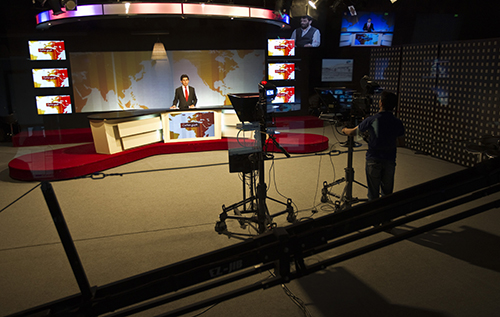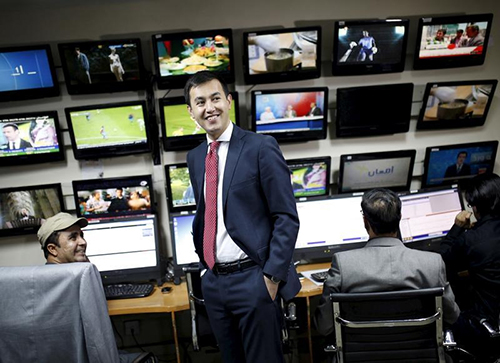For people outside of Afghanistan, the January 20 attack on the Tolo TV van, which killed seven people and wounded about two dozen more staffers, was just one more horrendous event in a series of bombings, military skirmishes, attacks, counter attacks, and standoffs around the country. The attack was widely reported but, for outside observers, it soon melted into the steady stream of body counts that seem to be the way the country is viewed by the rest of the world.
For journalists in Afghanistan, the attack in Kabul and the threats that preceded it seemed to mark a turning point. After January 20, media organizations understood that, as the Taliban put it, they could be seen as “legitimate military targets.” (To get a sense of the danger Tolo TV staff face, you can read four threatening statements from the Taliban, translated into English by Tolo TV staffers, here, here, here, and here. Also, see CPJ’s alerts on attacks and the killings of journalist and threats by the Taliban in October last year.)
The privately owned Tolo TV is one of the country’s most successful broadcasters, airing news and entertainment and branching into regional broadcasting too. At the news operation, Lotfullah Najafizada has been a regular contact for me. He directs news and current affairs content for the station. One of his bosses, Saad Mohseni, wrote eloquently in an op-ed for The Australian about the aftermath of the attack. I’ve been speaking with Tolo TV and 1TV, which was also threatened but, not so far, hit with the same vehemence that Tolo TV has had to face. Najafizada, who has to confront the daily reality of heading a news operation under constant threat, agreed to answer some questions about life at Tolo TV in the aftermath of the January attack.
Lotfullah, it’s well past 40 days since the January 20 attack. The traditional mourning period is over, the victims buried, the commemorative ceremonies have been held, Tolo TV is back at work. It seems like you never skipped a beat really, but what has changed? Have you found a way to address the threat faced by you and other Afghan media?
We have put measures in place to minimize the risk. It’s no longer the routine. Our life is difficult. A number of colleagues, including myself, avoid going home regularly. There is no easy way out of this. We keep doing our work because we know it’s not just about us, but for [the] freedom of all Afghans, which is hard won. History will judge us and we want to be judged right.

Tolo staffers always seemed to me like they knew they were working for a solid news operation, one they took pride in being a part of. There was a buzz in the newsrooms, a sense of being part of something larger. How is morale holding up?
Morale is unexpectedly high after the attack. I had my reporters coming to me saying that they are standing firm and the only way for us to move [is] ahead. The journalists were under immense pressure from their families after the attack, but all of them managed to make their parents, wives, husbands, children, and relatives understand that they are on a mission of safeguarding freedom for their generation [and] the ones to comes–something all of them are very proud for. One of my reporters explained to me how his wife was making him touch the Quran every morning before leaving for work and wishing him a safe day with tearful eyes as it could be their last meeting. It is resilience indeed which made things unchanged. Tolo news is still a platform for over 1,000 guests to appear on its programs every month and raise a voice, and the channel is still a hub for over 30 news packages a day, produced by brave journalists who report from across the country.
I know you can’t divulge specifics, but what has Tolo TV done to secure its operations? The last time I was there, the studios and offices seemed well bunkered, but have you stepped up security even more? A news gathering organization has to be out on the streets, employees have to go to work and go home. This seems too vast an operation to be able to guarantee each employee their personal safety. How do you approach this challenge?
We can’t guarantee anyone’s security. The compound is safer and the guards are on the highest alert. More security briefings happen. But journalists do go out every day and are exposed to threats. A TV channel cannot safeguard streets of one of the most dangerous capitals of the world.
I know there were investigations and reports of arrests after the attack, but has anything come of them? Is it realistic to think that any of the planners behind this attack could be brought to justice?
Well, the Taliban did it and everyone knows who they are and where they are. [Editor’s note: The Taliban released a statement the day after the attack, claiming responsibility, according to reports.] If Afghan blood matters, if freedom, democracy, and free speech in Afghanistan are still values we stand for, the international community and the Afghan government can bring them and their paymasters to justice. The Taliban, for Americans, is not even a terrorist group.
What do you think President Ashraf Ghani can do to better protect Afghan journalists and media organizations? If we had to draw up a list of recommendations, what would they be?
The Afghan government has a constitutional responsibility to protect all its citizens, including media professionals. Nothing substantial has been done on the Afghan government’s side to ensure greater safety for journalists. I don’t think unions can do much.
The president seems committed to supporting media freedoms, but does that permeate his entire administration? We used to see, under Hamid Karzai, that he grasped the importance of a free media, but CPJ found some of his aides, especially those linked to military and security operations, did not always feel that way.
This government wants to bring media under its thumb if it can. It was the case under Karzai and now under Ghani. The Afghan media is still [too] strong for the Afghan government to censor it or give it direction. I believe our freedom is directly linked to our strength. The weaker we are, the less free we are.
In 2013, when I wrote “Afghan Journalists Steadfast as International Withdrawal Approaches“ for CPJ’s annual publication, Attacks on the Press, you told me, “Almost everyone who has gained something in the last 10 years is worried about losing it.” You added, “Post-2014, violence could get worse, but even if we saw the return of the Taliban it would not be a repeat of the dark regime. Media and press freedom would not go back to point zero.” Do you still feel that way?
I still believe that two thirds of the Afghan population, who are under the age of 25 and grew up with a free press, cannot allow their values to vanish overnight. We are at a critical juncture indeed and we need to demonstrate more resilience to sustain our gains.
